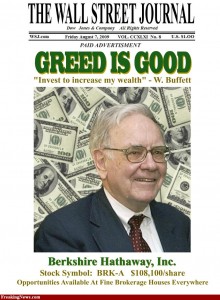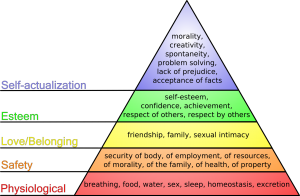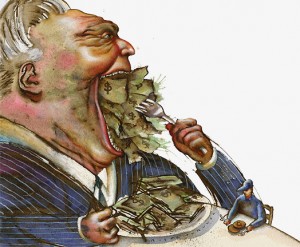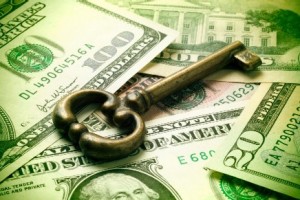“Radix malorum est cupiditas” – “Greed/money is the root of all evil”
Another old saying is that “money won’t buy you happiness”, to which some modern wit added “…but it can make you unhappy in style.” Worse than that, money corrupts even more than power, and fables like Chaucer’s Pardoner’s Tale illustrates that possessing money causes greed and unhappiness, and here, death. And let’s face it, greed was one of the seven deadly sins, though it did not stop the Roman Catholic church accumulating unimaginably vast wealth.
What of those working people who win vast sums on the lottery, such as the Bayfords. They won £148m, said they will continue to live a normal life with the help of a few luxuries, but will give some money away to friends and family, and will doubtless be fighting off hordes of begging letters ever after. They won more than they will ever need. Maybe it would be better for 148 people to win £1m each, a sum that will set them up for life but not too much that they would be tainted or suffer from the burden of possessing vast wealth and never being able to trust anybody ever again – though the organisers say far fewer people would enter the lottery in that case – despite the odds of winning being much higher.
If the Bayfords wanted any precedents of the dangers of big lottery wins, they would not have to look far. Viv ‘Spend Spend Spend’ Nicholson was certainly not made happier by her pools win, and there are plenty more examples of people whose lives have been ruined by coming suddenly into unimaginable wealth (see here and here for example.) Are we all greedy at heart but frightened to admit it?
Ah, but remember the maxim of Wall Street: Greed is Good – it creates wealth, desire, hunger, an upward spiral to success. Except, of course, when it crashes and causes despair, bankruptcy and a different sort of hunger.
So should the wealthy not contribute a higher proportion for the good of society, and to help redistribute wealth to enable equality of opportunity for all?
The main argument applied by the wealthy against taxing more highly what banks refer to as High Net Worth individuals, comprising (a) the wealthy (many of whom may have inherited wealth from parents or other relatives and (b) employees with high incomes (which may or may not include entrepreneurs and those who live off investment income), notably bankers and executives with fat bonuses, footballers and others is that it will prove a disincentive to effort and the scarce talent concerned will merely take their money elsewhere or fail to start new businesses. These people need more money so they can filter it down through society, we are led to believe.
Fair to say that in practice, the majority don’t spend much of their extra cash to stimulate the economy, but do salt it away where the absolute minimum can find its way to the taxman, and in a notable proportion of cases through illegal evasion rather than legal avoidance. If the equivalent money was given in much smaller bonuses to people lower down the pay scale, the chances are that a far higher proportion of it would be spent, which would also generate a higher rate of tax return.
This takes me back to good old Abraham Maslow and his hierarchy of needs. This is well known so I don’t need to labour it, but his essential point stands: once your physiological needs have been met, then safety and security – the comfort blanket for you and your family – you are not motivated by wealth as much as by more personal factors, culminating in self-actualisation and status.
The grouping on the pyramid most likely to hit the buttons of high earners is, however, esteem – and in the shallow world of traders and executives you have no esteem unless you have toys and piles of cash. But that in itself won’t spur you on to greater effort since you don’t actually need it. What are your goals in life? Focus on them!
So why do banks and other institutions need to pay massive bonuses to people who are already hugely well rewarded for doing their jobs, if it doesn’t actually spur them to greater effort? If they already have millions in the bank, surely they have no need to try as hard? Are their egos so all-consuming and fragile that unless they have huge wodges of cash flowing in they will shatter into a thousand pieces like a crystal vase?
There is certainly an amount of childish competitiveness and vanity about the rush for cash, along the lines of “I think I am better than A, so if A is earning £X million a year, then I must earn £Y million to keep ahead.” Thus the escalation spiral rises if A thinks he is better than B, and so on. It’s not the money that’s needed, it’s the competitive advantage and status conferred by that money, though as Oscar Wilde put it, “The cynic knows the price of everything and the value of nothing” – and there are few so cynical who know they can get away with being paid stupid money in respect of very ordinary performance, in many cases.
This article is fascinating, detailing a study on American knowledge of and attitudes towards wealth. The participants seemed surprised that the top 20% of Americans owned 84% of the wealth of the country. Twas ever thus, but the worrying thing in times of austerity is that the differential between rich and poor seems to be growing: the rich grow richer, and the burden of meeting the gap in financing falls upon the poor and middle classes in the form of a pincer attack: higher prices, higher taxes, lower government spending, stagnating wages, higher unemployment. The wealthier you are, the greater your ability to insulate yourself against hard times, unless your money is an area of greatest vulnerability (eg. bank shares before the collapse.)
But in our relatively free society an unequal division of wealth is inevitable. We are all motivated by money to some degree, we want enough to pay the bills, buy the occasional luxury, fund our lifestyles – which in some cases needs to be reduced according to circumstances. I have some expensive tastes, to be sure, but I will try the Great Budget Challenge in such as way that I can live within a limited budget but compromise as little as possible – or do without some things, not others.
However, I’ve never been motivated by money for the sake of money, even though I can earn a fair amount of it when client work prospers. C’est la vie – you have to take the ups and downs, sometimes you’re flush and sometimes you’re skint. But the things that make life worth living you can’t buy at any price. The Beatles had it right!
PS. This article puts an interesting slant on the topic:
Are the super-rich really wealth creators?
The revision of the second quarter growth figures which now show the UK economy contracting by 0.5% compared with the original estimate of 0.7% obviously gives Osborne some (small) relief, but still means that the economy has shrunk by 0.6% in the last year and has been flat for the last 2 years as a whole – the period that this Tory-led government has been in office. As a result of this sharp decline in tax receipts Osborne is now forced to borrow some £158bn more than planned and austerity may well extend to 2020.
In the short term this rising gap can only be covered by cutting benefits or public spending even more sharply or by raising taxes. It is a certainty that Osborne will rule out any increase in taxation for the super-rich, even though that would be the most obvious and fairest way of raising significant funding quickly, on the grounds that they are the wealth-creators who must be protected and indeed cosseted. He is wrong on two counts.
First, if they are really wealth-creators, it’s strange that other countries are increasing taxes on them. Spain and Italy, both with right-wing governments, have extended surtaxes on the rich. Hollande, the new French President, will this autumn impose a 75% tax on those earning more than €1 million (£835,000) a year, the richest 0.4%. Even in the US the presidential election is being fought around Romney’s private equity and tax avoidance habits as opposed to Obama’s declared intention to raise the top rate of income tax from 35% to 40% and to increase taxes on capital gains and dividends. Once again Osborne cuts a lonely figure in preferring to hammer the poor to subsidie the rich.
But the real argument against Osborne’s anti-poor and pro-rich stance is that the super-rich by and large aren’t wealth-creators in any significant measure at all. Of course there are the outstanding entrepreneurs like Steve Jobs and James Dyson who genuinely create wealth, but they are the exception rather than the rule. Of the 20 persons with the fastest growing fortunes in the UK (according to the Sunday Times Rich List 2012, p.12), only 6 made their money from industry; 4 made their wealth from property, 3 from the internet and 6 from finance and investment.
That’s the 0.001% richest. Below that stratospheric level of wealth the evidence is that the super-rich amass huge sums, not at all as creative or innovative entrepreneurs, but out of paying each other handsomely through shameless mutual back-scratching remuneration committees. There are dozens of cases where top executives are awarded huge rises even when the share price of the company has plummeted.
Enormous ‘golden goodbyes’ are handed out to failed chief executives to get rid of them. Even the bankers who dole out colossal bonuses to themselves can hardly be described as wealth-creators when they’ve produced the biggest destruction of capital wealth in the biggest financial crash in the modern era, driving up the national debt to some £1.4 trillions.







